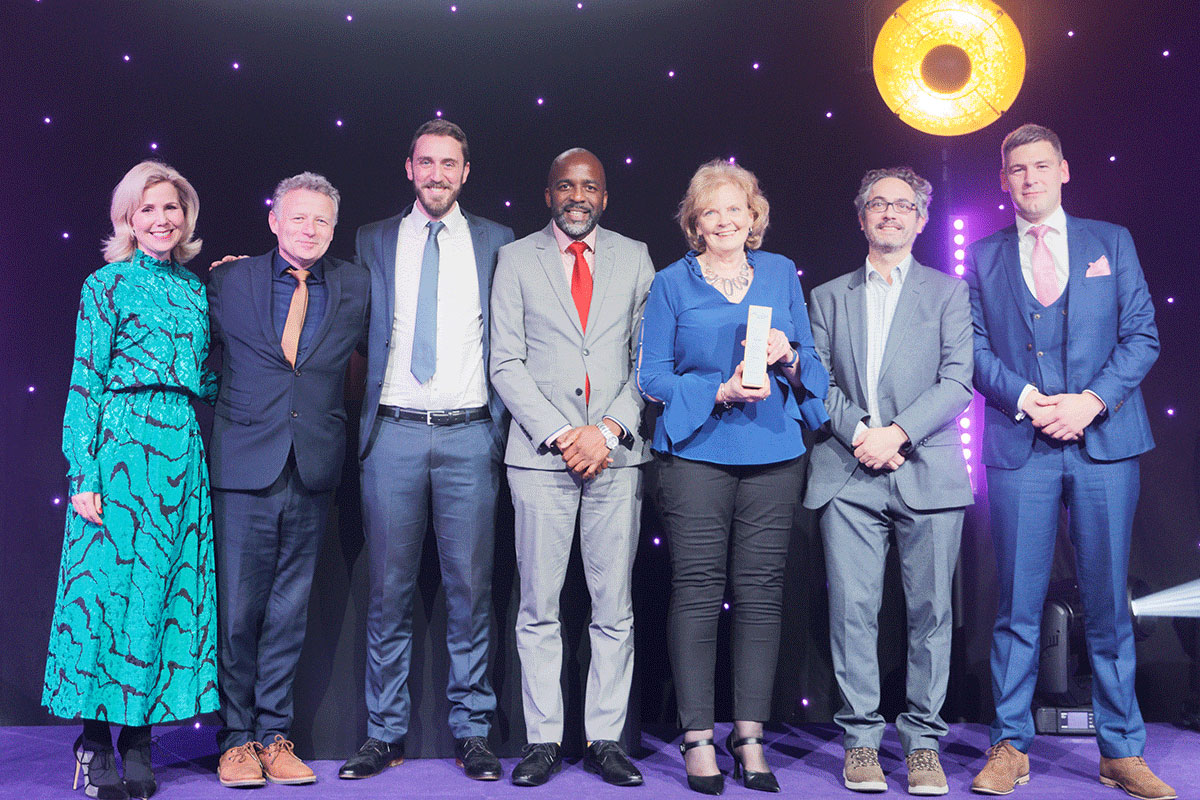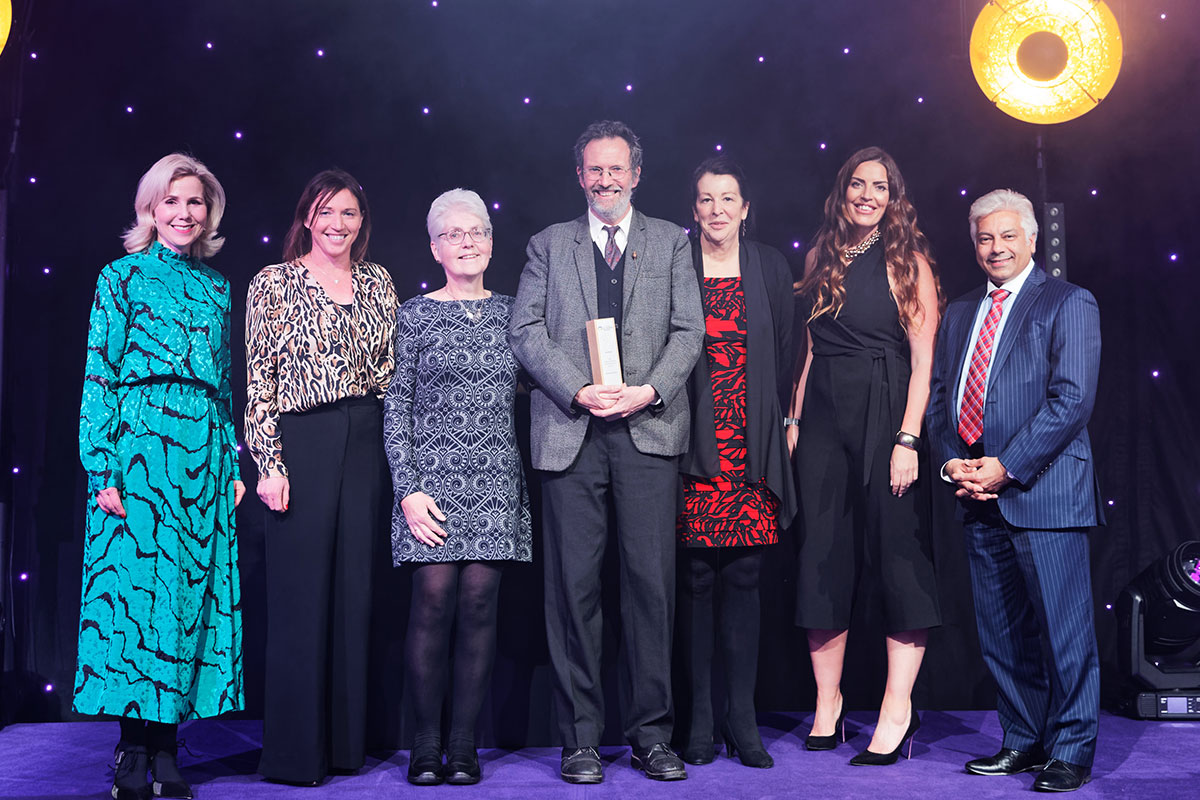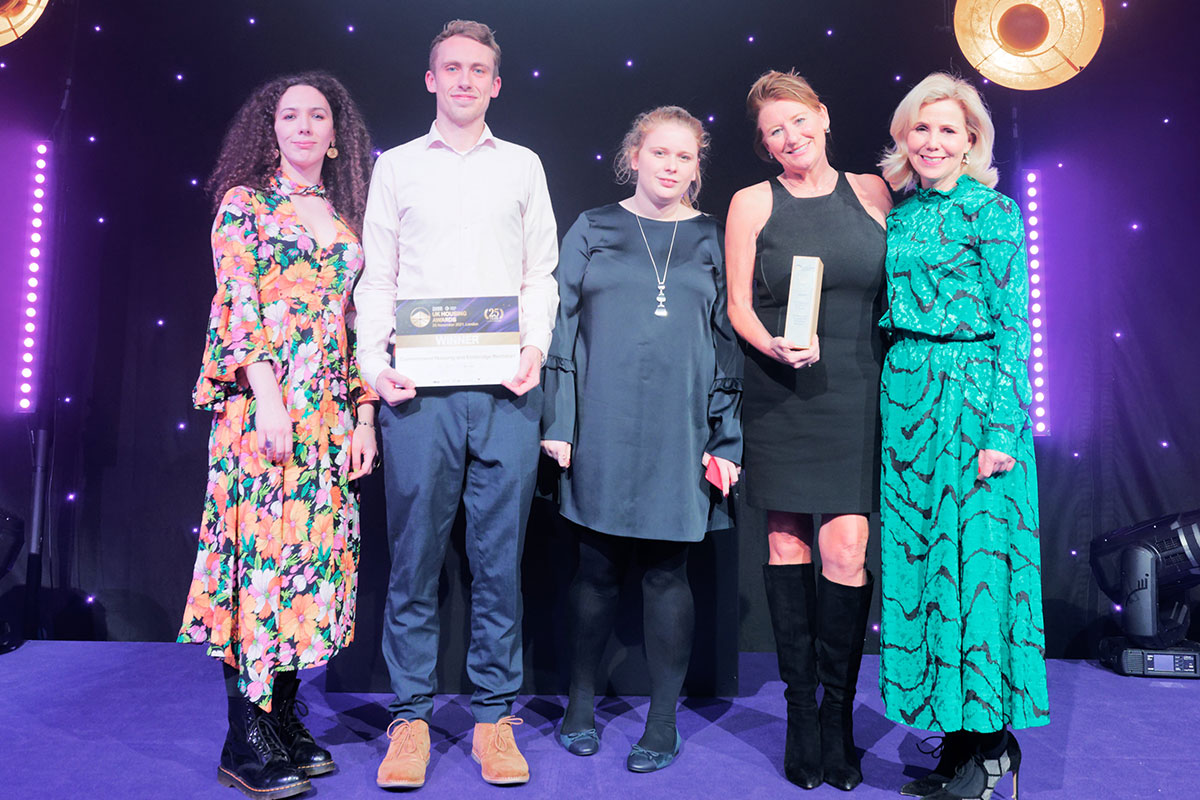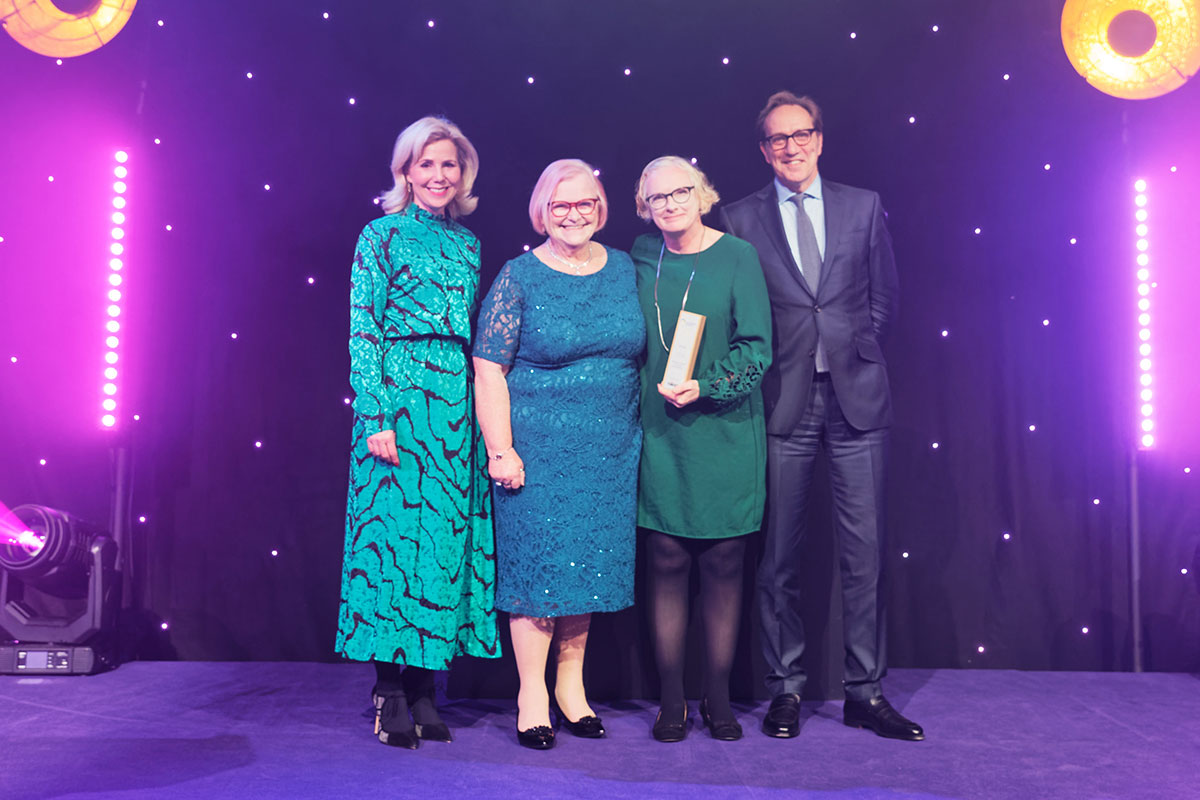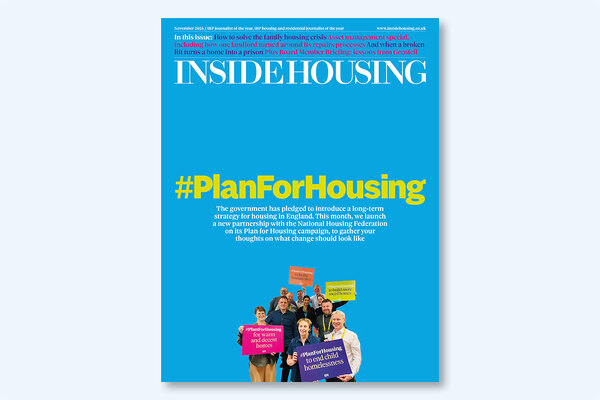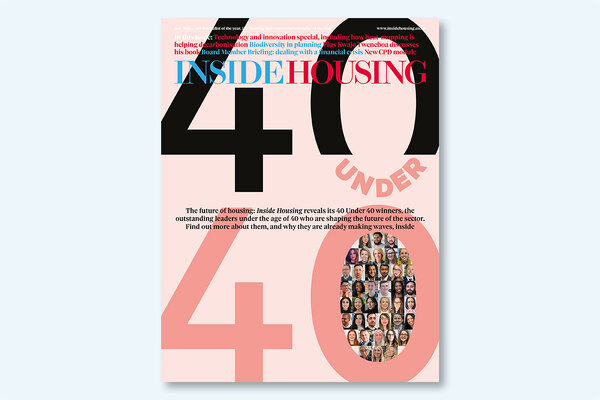You are viewing 1 of your 1 free articles
UK Housing Awards 2021
Inside Housing reveals the winners of this year’s UK Housing Awards. Photography by Jason Alhuwalia
Since 1997, the UK Housing Awards have shone a light on the teams and individuals whose commitment and work has made an impact on the people and communities they serve.
The UK Housing Awards 2021 took place on 25 November at InterContinental London – The O2. The awards were presented by comedian Sally Phillips, with winners announced across 19 categories, including projects that have sought to eliminate homelessness, campaigns to enable residents to upskill and enter the workforce, effective climate change initiatives and many more.
The judging panel represented an array of leading voices from across the sector, who assessed the entries, created the shortlists and decided on the winners over two judging days.
Well done to all our winners.
Welcome to a celebration of the UK Housing Awards 2021 – the 25th year of the event.
Here, we will showcase the very best the housing sector has to offer.
Quite rightly, there is more scrutiny than ever in the wider world on landlords’ performance. The drive for zero-carbon housing also means that the way the sector builds and manages homes is undergoing a huge transformation.
Against this context, the UK Housing Awards looks to identify the very best and most innovative ideas and practice in the sector. From campaigning to climate change, supported housing to innovation, the finalists at this year’s ceremony have plenty to shout about.
Thanks to the hundreds that entered this year – and congratulations to the 139 finalists and 19 winners. And a huge thank you to the judges who have pored over the entries and agonised over their selections.
Finally, thanks also to our sponsors for making this event possible.
Martin Hilditch, editor, Inside Housing
Contractor of the year
Housing Plus Group
- Went above and beyond to deliver an exceptional service throughout lockdown
- Earned customers’ trust through communication and consistent messaging
- Continued to deliver essential repairs despite the wider challenges
Property Plus is the in-house contractor providing repairs and maintenance services for Housing Plus Group. It employs 345 people and is responsible for 18,000 homes across Staffordshire and Shropshire. In a year defined by COVID-19, Property Plus went above and beyond to deliver an outstanding service. It focused on two clear objectives: keeping staff and customers safe and continuing to deliver essential repairs.
The contractor earned the trust of customers through great communication. An online campaign called Help Us To Keep You Safe was highlighted on social media and in every message to tenants. It emphasised the importance of essential safety checks and showed how operatives were working differently. Managers and staff went out in the evenings and weekends to reach out to customers. They called on the support of the communications and neighbourhoods teams to engage with worried tenants and provided consistent messaging to customers.
Property Plus maintained essential repairs throughout lockdown. Teams undertook 115,584 visits to customers and overall repairs volumes were down just 9% on the previous year.
The judges said:
“It’s clear this organisation is focused on excellent customer delivery and making a strong impact for the communities it serves – and takes its responsibilities very seriously”
This category was judged by:
Lorri Holding, head of customer services, Warrington Housing Association
Grainia Long, chief executive, Northern Ireland Housing Executive
Homebuilder of the year (16,000 homes or less)
Reading Borough Council
- Reading is delivering more than 307 new council homes over the next four years
- The emphasis is on sustainability, quality and meeting locals’ needs
- These new homes are all going to be built to follow Passivhaus standards
Reading Borough Council’s ambitious housebuilding programme aims to deliver more than 307 new council homes over the next four years at a cost of around £80m. As well as providing sustainable, quality homes that meet the needs of local residents in a borough where surplus land is in short supply, the council also aims to set a new standard for net zero carbon homes that will benefit residents for decades to come.
In 2019, the council declared a climate emergency and therefore aims to deliver a carbon-neutral borough by 2030. As part of this, the new homes are being built to follow Passivhaus standards. As well as reducing greenhouse gas emissions and delivering significant long-term energy savings to tenants, the low running costs and higher-quality building standards mean the day-to-day costs of residency are significantly reduced over the life of the buildings.
The council has also committed to delivering sites that offer a sustainable location for residents in terms of access to employment, schools and other local services via good public transport and pedestrian and cycling networks, as well as through the provision of electric car charging points.
The judges said:
“This council has ambitious development goals for the next five years. It’s clear about how it will do this sustainably while engaging with the communities where homes are being built”
In round one, this category was judged by:
Tracy Harrison, chief executive, Northern Housing Consortium
Nik Turner, executive director of communities and customer services, Believe Housing
In round two, it was judged by:
Abi Jacobs, director of strategic partnerships, L&Q
Jack Simpson, news editor, Inside Housing
Sponsored by:

Homebuilder of the year (more than 16,000 homes)
Dudley Metropolitan Borough Council
- Maybank Fields is a development of 10 new purpose-built bungalows on a wasteland plot
- Six are wheelchair accessible; all provide level access throughout
- This shows what can be achieved through sustained investment in housing services
Dudley Council had 211 people on its disability register in need of adapted properties, 22 of whom required wheelchair access and up to three bedrooms. Everyone in this group receives support from the council’s housing occupational therapists, but it was increasingly challenging to meet specific needs within Dudley’s existing stock.
Left unaddressed, this situation affects the individuals, their families and other services supporting them, including health, social care, children’s services and the third sector. But a plot of wasteland offered a unique opportunity to help meet these needs, and to bring relief to neighbours who were suffering from anti-social behaviour.
Today that plot is home to Maybank Fields, a development of 10 bungalows built with residents’ needs in mind. All offer level-access living, six are wheelchair accessible and one features an electrical height-adjustable kitchen that allows the tenant to lower or raise the worktop via a switch.
This development shows what can be achieved not only through the practical process of building a home, but also through sustained investment in housing services.
The judges said:
“The impact of these homes on the lives of individuals and their families is clear. The council has clearly created efficiencies and enabled delivery of a site that looked unviable”
This category was judged by:
Tracy Harrison, chief executive, Northern Housing Consortium
Nik Turner, executive director of communities and customer services, Believe Housing
Sponsored by:

Professional services partner of the year
Voicescape
- Voicescape works with more than 40 registered providers in the UK
- Its software helps providers connect with their customers efficiently and meaningfully
- Customers cite improvements to everything from arrears collections to well-being checks
Voicescape works with more than 40 social housing providers in the UK, which use its technology to connect with more than 500,000 tenants. Voicescape offers simple, flexible, technology-based solutions that are responsive to individuals’ changing requirements. These tailored solutions allow its customers to maximise operational efficiencies, reduce costs and increase their engagement rates with customers.
This was evident in the pandemic, when landlords had to deal with an increase in demand for their services across a spectrum of issues while managing their own organisation’s needs. Voicescape delivered a number of goodwill campaigns in 2020 to ensure the pandemic wasn’t a barrier for organisations wanting to use the technology for essential purposes.
Voicescape has supported registered providers to understand their tenants’ needs and behaviours better. The company has grown its offer to provide services for rental collections, well-being checks, compliance and tenant feedback, achieving exceptional results for customers to help support their residents against an extremely challenging backdrop.
The judges said:
“Voicescape has shown innovation in providing a data-driven service using automation that supports organisations in contacting customers to offer services and support”
This category was judged by:
Marion Duffy, chief operations officer, Platform Housing Group
Pam Mastrantonio, executive director of retirement living, Housing 21
Campaign of the year
Centrepoint
- Centrepoint’s campaign has materially improved the lives of vulnerable young people
- It has secured the same Universal Credit housing rate for under 25s as exists for over 35s
- It has ensured that young people in care or living in hostels can move on with their lives
Centrepoint’s ambitious Chance to Move On campaign aimed to ensure that Universal Credit (UC) claimants under 25 who are leaving care or living in a hostel for the homeless could access a higher level of UC for their housing costs.
When this campaign began, young people in this group were only able to claim the ‘shared accommodation’ rate of Universal Credit, which often meant that when the time came to move on, they were priced out of renting in many parts of the country. The campaign aimed to secure the same rate of UC for their housing costs as that for over 35s, who are able to claim the higher ‘one-bed’ rate.
The campaign was a resounding success. In March 2020, the government committed to spending £10m per year to enable formerly homeless young people to claim the higher rate of benefit to cover their rent costs. However, the chancellor said this change would not take place until 2023.
Centrepoint continued campaigning to bring the change forward – and was successful again. From June, vulnerable under 25s claiming UC have been entitled to the higher rate.
The judges said:
“Under 25s are a forgotten section of society. This campaign led to a policy change for the benefit of hundreds of people aged under 25 as they move on from shared accommodation”
This category was judged by:
Nusheen Hussain, executive director – business development, Home Group
Dilip Kavi, chief executive, PA Housing
Digital landlord of the year
PA Housing and Prodo
- PA Housing has launched a digital residents’ portal called My PA
- It gives residents access to both their accounts and PA Housing services 24 hours a day
- The portal already averages around 20,000 logins per month
My PA is the name of PA Housing’s digital residents’ portal. It gives residents access to their accounts 24 hours a day, 365 days a year, so they can make payments and book repairs. On average, it takes less than a minute for a resident to receive an answer to questions via live chat. By comparison, calls take an average of between three and four minutes to be answered.
As well as improving residents’ lives, My PA also enables PA Housing to make more efficient use of its resources. On average, a My PA user calls PA Housing’s contact centre 1.5 times less frequently than residents who don’t use the app – this has amounted to as many as 14,250 fewer calls. Regular monthly use of My PA has jumped from 50% of residents before March 2020, to 86%. More than half of all PA households now have at least one member signed up to My PA, and together they average more than 20,000 logins per month. Between 200 and 300 new residents register for My PA each month.
This digital approach has driven up efficiency and customer satisfaction by creating a more straightforward and streamlined way for residents to access the services on which they depend.
The judges said:
“PA Housing had the edge because of its approach to customer engagement, equality and diversity, and acknowledgement of the need to continuously review, learn and make changes”
This category was judged by:
Gudrun Carlisle, services director, Horton Housing Association
Sue Sutton, chief executive, Salix Homes
Sponsored by:

Innovator of the year (customer services)
Optivo
- Increase Valorisation Sociale supports social housing residents to become self-employed
- It trains and funds residents of deprived areas on both sides of the English Channel
- The project has helped 3,200 clients to date, 650 of whom have started their own businesses
Increase Valorisation Sociale is an innovative project led by Optivo and run in partnership with Clarion Futures, Abri, four French housing associations, training providers Weker and INCO, and the University of East Anglia. It pilots self-employment as a career path for social housing residents, and was launched in light of the fact that this is a route taken by an increasing number of people in the UK.
The project focuses on 38 English and French coastal and rural neighbourhoods where tourism and industry have declined. Residents are often stymied by long-term unemployment and other barriers. This project helps residents start their own businesses, even if they do not have the start-up capital. The training is flexible and fun, and focuses on the clients’ interests and skills. This is combined with specialist advice from peers and partners.
The programme has supported 3,200 clients, 650 of whom chose to start a business in sectors including construction, arts or beauty. Many other clients went on to find jobs, or have moved into further education. Last year, the service adjusted to support clients to continue to learn and trade online.
The judges said:
“This is a simple idea that has the potential for far-reaching benefits. It’s a good model of partnership-working and a good example for other similarly challenged areas”
This category was judged by:
Mushtaq Khan, chief executive, Housing Diversity Network
Becky Utuka, director of development and sales, Gateway Housing Association
Sponsored by:
![]()
Innovator of the year (housing delivery)
Blend Network
- A technology-driven platform for connecting lenders with borrowers in the development space
- Blend Network shows that fintech can play a significant role in addressing the housing crisis
- The firm has won multiple awards and continues to go from strength to strength
Blend Network is a multi-award-winning, peer-to-peer lending platform that connects lenders and borrowers in the residential real estate market and funds small and medium-sized property developers building low-cost, more affordable housing in the UK. The strategy behind this approach is to lend into under-served regions of the UK property market and to those developers that, despite their experience and track records, are under-serviced by traditional funding channels due to their size.
Two recent examples of Blend Network’s successful approach include that it funded a £1.7m loan in six minutes in March and, in May, it funded a £1.1m loan in less than one minute.
As of June, Blend Network has delivered an average return of 10.1% per year to its lenders and has a track record of zero defaults.
Since inception, Blend Network has also been strongly committed to female financial inclusion. As a result, in May 2020 the company was shortlisted as a finalist in the ‘diversity initiative of the year’ category atthe Women in Finance Awards 2020.
The judges said:
“Blend’s lending to smaller builders and developers has enabled many more affordable homes to be built”
This category was judged by:
Mushtaq Khan, chief executive, Housing Diversity Network
Becky Utuka, director of development and sales, Gateway Housing Association
Sponsored by:
![]()
Innovator of the year (technology)
Invisible Creations
- Dual-purpose home adaptations that support residents’ mobility and dignity
- They include a plant holder, shower shelf and bathroom mirror that all double as grab rails
- Their aim is to address the stigma associated with home adaptations for older and disabled people
Invisible Creations launched in the UK in January 2020. Its products are beautiful, dual-purpose adaptations that blend seamlessly into homes to assist people around their living space, to prolong mobility and promote independence. All are designed to remove the stigma associated with products for older and disabled people.
Research shows people would rather put their health at risk than get current adaptations installed. People don’t want to ‘medicalise’ their homes; instead choosing to adapt their behaviour, such as restricting food and drink to limit trips to the bathroom.
Invisible Creations’ product range includes a decorative plant holder that also functions as an exterior grab rail. It also has three dual-purpose bathroom products – a shower shelf, mirror and toilet roll holder – which incorporate the functionality of a grab rail with style.
Minor adaptations are an effective and cost-effective intervention for preventing falls and injuries. By providing more attractive, dual-purpose home adaptations that are desirable rather than off-putting, Invisible Creations supports people to live independently for longer.
The judges said:
“It’s unique and the designs blend in well. It has the potential to make a huge difference to people’s lives and to ensure homes are better able to cope with people’s changing needs”
In round one, this category was judged by:
Mushtaq Khan, chief executive, Housing Diversity Network
Becky Utuka, director of development and sales, Gateway Housing Association
In round two, it was judged by:
Martin Hilditch, editor, Inside Housing
Sandip Shergill, director of procurement, Notting Hill Genesis
Highly commended
HomeViews
Sponsored by:
![]()
Climate change project of the year
Gentoo Group
- Core 364 is the biggest housing decarbonisation project in the UK to date
- It is a £9m scheme to replace 364 gas boilers with heat pumps in Sunderland
- The scheme has cut tenants’ bills and fuel poverty while tackling climate change
Core 364 is a pioneering climate change retrofitting scheme and the biggest housing decarbonisation project in the UK to date. It brings together multiple benefits of energy efficiency to positively affect the lives of tenants, alleviate fuel poverty, reduce the impact of social housing stock on the planet, and maximise building safety. The project originated from Gentoo’s need to modernise the gas-powered heating and hot water systems in 364 dwellings across seven high-rise tower blocks in Sunderland.
Gentoo worked with technical services firm Equans to design a £9m scheme that addresses the ageing heating systems in the blocks while delivering energy efficiency. The scheme involved replacing inefficient gas boilers in the properties with an open-loop ground-source heat pump system that generates renewable heat and hot water.
Tenant engagement was at the heart of this scheme, and this started well before it was approved and delivered. The scheme has lowered tenants’ bills and is helping to alleviate fuel poverty at the same time as tackling climate change; the project will save an estimated 8,322 tonnes of CO2-equivalent emissions over the next 20 years.
The judges said:
“This project is an ambitious retrofit of multiple tower blocks, incorporating fire safety and carbon reductions. It’s a great model for the kind of work that needs doing UK-wide”
In round one, this category was judged by:
Matt Jukes, chief executive, Hull City Council
Jo Richardson, president, Chartered Institute of Housing, and professor of housing and social inclusion, De Montfort University
In round two, it was judged by:
Jess McCabe, deputy editor (features), Inside Housing
Clare Miller, chief executive, Clarion Housing Group
Sponsored by:

Resident employment and training award (15,000 homes or less)
Poplar Harca
- Maintained high levels of service during the pandemic with creativity and diligence
- The team kept supporting its clients to find work and access support
- Managed to surpass its pre-pandemic targets for helping clients access training
The impacts of COVID-19 were felt most by families living in poverty. Working with local people in Tower Hamlets, one of the most impoverished boroughs in London, has been extra challenging for the Communities and Neighbourhoods (CaN) Directorate at Poplar Harca. But this organisation’s colleagues showed great resilience and commitment in overcoming these difficulties.
Together with residents, local and regional partners, donors and funders, Poplar Harca faced the pandemic head on and used creativity to continue delivering much-needed services to local communities.
Many job seekers who used Poplar Harca’s employment and training service during the pandemic reported having job offers withdrawn and interviews cancelled. Others lost their jobs. Others asked for help accessing mental health support, food banks, money advice and NHS services. But throughout this period, the team maintained contact with all its clients and continued to deliver support online – and despite the pandemic, the team managed to meet the targets it had set at the beginning of last year. It even surpassed its target for getting people into accredited training, putting them in a better position to find decently paid jobs.
The judges said:
“As well as delivering their normal package of support, Poplar Harca got their programme helping migrants to get into jobs up and running, and exceeded their targets”
This category was judged by:
Aileen Evans, group chief executive, Grand Union Housing Group
Theresa Huburn, corporate director of people and learning, WHG
Resident employment and training award (more than 15,000 homes)
Nottingham City Homes
- An organisation that is clearly committed to getting people into work
- One of the country’s top apprenticeship employers, according to the government
- A true champion of boosting female representation in the workplace
Nottingham City Homes (NCH) continued to operate its Tenant Academy throughout each of the recent lockdowns. It moved its courses online but continued to provide free, needs-led training to help residents improve their knowledge, skills, pride and quality of life. The academy also helps residents take part in positive community engagement, which in turn helps build and sustain thriving communities. The academy is accessible to all ages and abilities and offers training in areas such as digital skills, first aid, basic household repairs, pre-tenancy training and family-based learning, as well as the skills to take on community roles.
This reduces loneliness and social isolation, boosting physical activity and overall health and well-being. NCH says it has helped to generate £17 in social value for every £1 invested.
NCH was ranked 30th in the government’s 2020 list of the country’s top 100 apprenticeship employers. Its apprenticeships cover a range of professions and are also offered to members of staff.
Also of note is NCH’s Women in Construction programme. It aims to promote the sector as a credible and vibrant female career choice.
The judges said:
“Judges were impressed with the breadth of the offer: their commitment to work experience, apprenticeships, Women
in Construction programme and Tenant Academy”
This category was judged by:
Aileen Evans, group chief executive, Grand Union Housing Group
Theresa Huburn, corporate director of people and learning, WHG
The neighbourhood transformation award
Grŵp Cynefin
- Grŵp Cynefin led a project to bring a derelict village shop in Penygroes back into use
- It is now a cafe, visitor accommodation and digital centre for young people
- The project has created eight new jobs and raised £1.3m for further investment
Twelve years ago, Siop Griffiths, the ironmongers in the Welsh village of Penygroes, closed after 85 years. It was one of the oldest buildings in the village, but due to a lack of maintenance deteriorated rapidly.
In 2013, Grŵp Cynefin was approached to see whether it could help save this building. The housing association agreed to help. A community consultation proposed turning it into a cafe, visitor accommodation and digital centre for young people. Over the next 10 weeks, the community raised the money to buy the building. Since then, the project has gone from strength to strength. As well as opening the cafe and accommodation, it has created eight jobs, launched a community transport scheme with three electric vehicles, bought two more buildings to increase the accommodation offer and developed a food and well-being project that includes allotments and a wildlife garden.
This project demonstrates the power of collaborative working. For every £1 originally raised by the community, a further £26 (£1.3m in total) has been raised for investment in building purchase and renovation, job and training creation, and service provision. A true asset.
The judges said:
“This is an excellent example of how to blend physical and social regeneration, and of how a housing association can act as a catalyst for the transformation of a neighbourhood”
This category was judged by:
Andrew van Doorn, chief executive, HACT
Ajman Ali, group director – neighbourhoods and housing, London Borough of Hackney
Homelessness partnership of the year
Commonweal Housing and Rentstart
- The Freedom2Work project addressed working homelessness in Elmbridge, Surrey
- Since launch in 2017, it has helped 96 homeless and vulnerably housed people
- The model is now ready to be scaled, adapted and replicated across the country
In 2017, Rentstart partnered with social justice charity Commonweal Housing to address ‘working homelessness’ in Elmbridge, Surrey. Many of Rentstart’s clients found that securing employment brought with it low pay, cuts to their Universal Credit and unstable working contracts, all of which jeopardised the security of their tenancies. Too often, Rentstart’s clients found themselves caught between either housing security or job security, with no clear route to securing both for the long term.
The Freedom2Work project was designed to address this cycle of homelessness and unemployment through a combined offer of stable accommodation, wrap-around employment support and a matched-savings scheme.
Since its launch, the project has helped 96 homeless and vulnerably housed clients achieve greater financial independence by helping them save a total of £9,775 before match-funding. This innovative model is ready to be replicated, adapted and scaled up to deliver potentially revolutionary benefits in cost savings, integrated support for clients and long-term benefits for homeless individuals and their communities.
The judges said:
“A great example about how tackling homelessness is not just about the bricks and mortar. An innovative approach – and great to see a commitment to spreading the learning”
In round one, this category was judged by:
Matt Dicks, director, Chartered Institute of Housing Cymru
Jon Sparkes, chief executive, Crisis
In round two, it was judged by:
Martin Hilditch, editor, Inside Housing
Alison Muir, executive director – housing services, St Mungo’s
Homelessness project of the year
Single Homeless Project
- Single Homeless Project’s Project Kali is the only gender-specific programme of its kind in London
- It focuses on helping homeless women with a history of offending
- Every client has been housed, and there has been a significant drop in reoffending rates
Project Kali was launched in November 2019 as a focused service for women who experience homelessness and have a history of offending. It is the only gender-specific project of its kind in London and addresses needs that can be unique to women facing homelessness. These include needs associated with domestic abuse, sex working and exploitation, and trauma associated with these experiences. Every woman referred to Project Kali had mental health needs, while a majority also had substance misuse issues.
The project operates on the principles of the Housing First model and responds directly to complex needs. This intensive wrap-around support gives women the best chance of gaining independence.
The project has obtained hugely positive outcomes. Every client has been placed in private rented accommodation or temporary accommodation provided by the local authority while the project’s staff find them a more permanent home. All clients in private rented accommodation have sustained their tenancies. There has been a significant reduction in offending and an increase in clients accessing specialist support, including substance misuse treatment.
The judges said:
“The outcomes of this project speak for themselves, but it is also clear that the support is sensitive, expert and absolutely tailored to the needs of every woman using the service”
This category was judged by:
Matt Dicks, director, Chartered Institute of Housing Cymru
Jon Sparkes, chief executive, Crisis
Best older people’s landlord
Alpha Living
- Alpha Living has undertaken a big programme of investment based on listening to residents
- Its homes are now more modern and user friendly, with bright and welcoming communal areas
- Impressive resident satisfaction scores show the positive effect this has had
Alpha Living is a housing association based in the North of England, dedicated to providing housing and sensitive services for older people. Its 960 flats offer residents a place of their own, but with the security and company of a team of development managers and housekeepers, and personal care personnel in its extra-care scheme. This landlord’s ethos can be summed up as ‘independent living with a helping hand’.
A recent resident satisfaction survey showed that, for 97% of residents, the most important thing was the quality of their home. As a result, Alpha invested. It replaced traditional bedsits with modern flats, spent money on improving the kerb appeal of properties and redesigned communal areas to make them bright and welcoming. Alpha also invested in making its homes more user friendly, creating level-access showers and bathrooms and using ‘invisible creations’ – adaptations that don’t look like mobility aids. Ugly grab rails have been disguised as shower raisers, for example.
Today, 84% of Alpha’s residents say they are satisfied with the quality of their homes, and 88% are happy with the service they receive from their landlord.
The judges said:
“Alpha Living is an organisation that puts residents at the heart of everything. Their care for residents shines through in their welfare support and how they listen in multiple ways”
This category was judged by:
Suzanne Lodge, chief officer (health and housing), Lancaster City Council
Rosalind Ugwu, interim housing services lead, Royal Borough of Kingston upon Thames
Best supported housing landlord
Centrepoint
- Homes is Centrepoint’s new psychologically informed operating model
- It aligns every aspect of the charity’s work to give young people the best levels of service
- The numbers bear it out; this project has been an unqualified success
Last year, the charity Centrepoint introduced Homes, a psychologically informed operating model designed to align every aspect of its services, from the staff and the environments it works in, to the services it offers, in order to give the young people it works with the best opportunity for a successful adult life.
Even under the strain of the pandemic – throughout which every one of Centrepoint’s 65 hostels stayed open – Homes has been an unqualified success. A highly impressive 96% of its young clients had a positive move on to a known destination between March 2020 and April 2021, while just 3.2% of the young people in Centrepoint’s hostels were in rent arrears last year.
Furthermore, 90% of the young people living in those hostels were either satisfied or very satisfied with the service they were receiving.
In recent years, Centrepoint has refined its offer to homeless young people. It has developed its physical and mental health support, provided life skills courses to help prepare young people for independence, and delivered a bursary programme that puts homeless young people through university.
The judges said:
“Amazing services provided to 16 to 25-year-olds. The approach is a blended one that not only looks at suitable supported accommodation but also takes a psychological approach”
This category was judged by:
Rohini Mehra, chief customer officer, Bromford
Tracy Woods, chief financial officer, First Choice Homes Oldham
Sponsored by:

Landlord of the year
South Yorkshire Housing Association
- This housing association has made a huge impact by doing the basics brilliantly
- It has made strides in tackling homelessness throughout South Yorkshire
- It has also kept momentum in its housebuilding programme and made the digital transition
South Yorkshire Housing Association has done the basics brilliantly. It has broadened its homelessness offer, expanding Housing First services across the region with new developments in Chesterfield and Doncaster. It collaborated with local authority and health partners to develop innovative solutions to support people’s move from temporary accommodation to a long-term home.
The housing association has also continued its long-term objectives of building new homes, tackling the climate emergency and transforming to a digital-first organisation while not leaving customers behind.
It has adapted its service delivery in imaginative ways to meet the twin challenges of the pandemic and racial injustice. It has invested in arts and creative activities to bring joy to people’s lives, boosting health and well-being in its communities.
South Yorkshire Housing Association has exceeded its targets for getting people with mental and physical health issues into employment. The housing association has also reduced loneliness and isolation for people over 50 across South Yorkshire by promoting neighbourliness and making more than 7,000 well-being calls.
The judges said:
“The focus on zero evictions is impressive and the move to co-production looks genuinely innovative. There is good practice here that others in this sector could adapt and use”
This category was judged by:
Martin Hilditch, editor, Inside Housing
Aaron Hill, director of policy and membership, Scottish Federation of Housing Associations
Gavin Smart, chief executive, Chartered Institute of Housing
Sponsored by:

Council of the year
Blackpool Council
- Blackpool has many social problems, as well as a poor-quality private housing market
- But sustained investment and direction from the council is turning this town around
- Its interventions are reducing unemployment and boosting the local economy
Blackpool is a small town with a big profile. A coastal resort in Lancashire, Blackpool has the highest deprivation rate in England, the highest incidence of drug and alcohol-related deaths and an extremely poor-quality private housing market.
The population of Blackpool is declining and ageing, with a chaotic transient community within its inner areas, which are some of the most densely developed and populated in the country.
However, after substantial recent investment by the local authority in its visitor attractions and seafront, Blackpool is starting to welcome growing numbers of visitors. Further investment is on its way, including a new conference centre, a tram link from Blackpool North Railway Station and new high-quality hotels. Investment in town centre offices and retail, and in the new airport enterprise zone is starting to help turn poor productivity, low wages and high levels of unemployment around.
Blackpool Council’s passion for its town has ensured that even a global pandemic has not prevented it from delivering in an extremely challenging housing market.
The judges said:
“This council demonstrated meaningful impact in a coastal community with a variety of challenges. The motivation to make a difference in their society shone through”
This category was judged by:
Jo Richardson, president, Chartered Institute of Housing, and professor of housing and social inclusion, De Montfort University
Matt Jukes, chief executive, Hull City Council
Sponsored by:
![]()
Judges
Ajman Ali
Group director – neighbourhoods and housing, London Borough of Hackney
Gudrun Carlisle
Services director, Horton Housing Association
Matt Dicks
Director, Chartered Institute of Housing Cymru<
Andrew van Doorn
Chief executive, HACT
Marion Duffy
Chief operations officer, Platform Housing Group
Aileen Evans
Group chief executive, Grand Union Housing Group
Tracy Harrison
Chief executive, Northern Housing Consortium
Martin Hilditch
Editor, Inside Housing
Aaron Hill
Director of policy and membership, Scottish Federation of Housing Associations
Lorri Holding
Head of customer services, Warrington HA
Theresa Huburn
Corporate director of people and learning, WHG
Nusheen Hussain
Executive director – business development, Home Group
Abi Jacobs
Director of strategic partnerships, L&Q
Matt Jukes
Chief executive, Hull City Council
Dilip Kavi
Chief executive, PA Housing
Mushtaq Khan
Chief executive, Housing Diversity Network
Suzanne Lodge
Chief officer (health and housing), Lancaster City Council
Grainia Long
Chief executive, Northern Ireland Housing Executive
Pam Mastrantonio
Executive director of retirement living, Housing 21
Jess McCabe
Deputy editor (features), Inside Housing
Rohini Mehra
Chief customer officer, Bromford
Clare Miller
Chief executive, Clarion Housing Group
Alison Muir
Executive director – housing services, St Mungo’s
Jo Richardson
President, Chartered Institute of Housing (CIH), and professor of housing and social inclusion, De Montfort University
Sandip Shergill
Director of procurement, Notting Hill Genesis
Jack Simpson
News editor, Inside Housing
Gavin Smart
Chief executive, CIH
Jon Sparkes
Chief executive, Crisis
Sue Sutton
Chief executive, Salix Homes
Nik Turner
Executive director of communities and customer services, Believe Housing
Rosalind Ugwu
Interim housing services lead, Royal Borough of Kingston upon Thames
Becky Utuka
Director of development and sales, Gateway Housing Association
Tracy Woods
Chief financial officer, First Choice Homes Oldham








